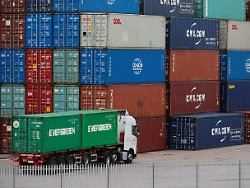Wednesday, December 1st, 2021
Clothes, pumpkin seeds, car bodies
Articles from millions of containers are being sold
In the chaos of the supply chain, many goods suddenly become cheap flotsam at their destination. Because deadlines have passed, the addressees refuse to accept them. It is the moment for recycling companies: there is a flea market atmosphere in freight ports.
The never-ending chaos of the supply chain is blooming more and more curiously. According to experts, innumerable containers with food, cars, clothing or household necessities are piling up at the world’s major goods transshipment points, which suddenly no longer have any buyers after a long odyssey at their destination. Many customers refuse acceptance because critical delivery dates have been exceeded and goods are no longer fresh or are simply no longer needed. The result: cargo ports are developing into giant open-air junk shops.
Niels Larsen, President of the global transport and logistics company Air & Sea North America estimates the number of containers that have no longer reached their addressees at three million. “If a product does not arrive at its destination for a long time, it often loses its original value,” quoted the US finance agency Bloomberg Tom Enders, owner of The Salvage Groups, a recycling company for abandoned cargo based in the US state of Michigan. The shipping companies contact his company so that they can clear the containers. That way, at least some more money will come in.
A total of 90 percent of goods and goods worldwide are now transported by container ships. The vast majority of clients are major customers. Delivery dates are an important part of the contract for worldwide mail order business. Among other things, perishable goods, seasonal items especially for summer or winter temperatures or supplier parts that may be attached to other orders are transported in the containers. If the goods arrive too late, there is no longer any need for them.
Retrieving the containers in such cases is too costly for overseas owners. Freight rates have more than doubled since April. The storage of goods is also too expensive. In addition, time is of the essence, containers are scarce. Shipping companies therefore only have one interest: loading them with new goods as quickly as possible and sending them back on their way.
This is exactly where the recycling companies come into play: Stranded containers are welded on at the transshipment points, and a quick glance is taken. Companies like The Salvage Groups then decide whether the goods are still worth cash – or whether the shipping company may have to pay extra for disposal. Business is booming.
The new problem solvers in freight transport
“We are a problem solver,” explains Jake Slinn, who with his two-man operation JS Cargo & Freight Disposal also buys container loads that nobody wants anymore. His company has already emptied more than 200 containers this year and redirected their contents. Even for spoiled goods, Slinn is often used. For example, old pumpkin seeds are fermented to produce methane for power plants. The inspection of a container always brings surprises, he says. After viewing the inner workings, the probing begins: “Where can I send this? What can I do with it?”
How big the market for rescued goods is, is difficult to estimate, according to “Bloomberg”, the business is highly fragmented. The company Salvex, based in Houston, Texas, is one of the ten largest major players in the United States. It allegedly sells $ 5.2 billion worth of goods on its online marketplace, not all of which come from sea containers. According to the company, the situation in Los Angeles, Long Beach and other ports is currently a “nightmare”.
The world’s largest cemetery for stranded goods in freight containers is Great Britain. The reasons for this are allegedly the Brexit and the six-day blockade of the Suez Canal by the freighter “Ever Given” in March. According to Salvex, the Christmas backlog will worsen the situation and ensure profitable business for at least six more months. Because for the freight transshipment points this means for the time being: Everything has to go.
Investigations into global container traffic jams are now in full swing. The US trade authority FTC recently announced a survey on supply chain problems and bottlenecks. Large companies such as Amazon, Procter & Gamble and Wal Mart will be asked, among other things, whether the problems have led to anti-competitive behavior and higher prices. According to a statement from the authorities, they also want to find out the reasons for the supply chain problems that have slowed economic growth. The companies should also describe how they are coping with the problems. You have 45 days to answer the questionnaire.
